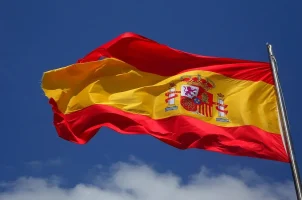Gamblers in Spain Face Additional Taxes Under Proposed Change
Posted on: September 30, 2022, 06:54h.
Last updated on: September 30, 2022, 01:01h.
Spain’s gambling industry is strong, despite a slight drop in overall performance in the second quarter. It’s so strong that the government wants to squeeze a little more money out of it by changing the tax laws.

Spain’s Ministry of Finance has decided there’s a flaw in the tax code. It argues that this “deficiency” allows gamblers not to have to report prizes of up to €300 (US$294.75).
For this reason, it submitted a proposal to modify the language of the code. Specifically, it wants to amend the code that governs the declaration of withholdings and payments related to personal income tax. That would apply on income from work and economic activities, gambling prizes, and certain capital gains.
Tightening the Tax Screws
After the change, the lower premiums must also be included in order to check if there is a capital gain. The change will affect the declarations made in 2023 for 2022.
Arturo Jiménez, director of the Study Office of the Spanish Association of Tax Advisors (Aedaf, for its Spanish acronym), broke down what the change means in a recent analysis of the reforms. He explained that there are two main types of awards that have their own respective reporting guidelines.
One type covers “official” awards that include instant-win lotteries and lottery draws. These, as a general rule, have a minimum exemption of €40,000 (US$39,248) for tax-obligation purposes.
The other covers games of luck, stake or chance, and bets, which covers casino gambling and sports betting. All of them are also subject to withholding today, beginning at 19% for anything up to €12,450 (US$12,215). The tax code states that the minimum reporting threshold is €300.
This inadvertent gap, according to Jiménez, causes these gains to avoid the taxman’s radar. Whether the government initially intended to give Spaniards a tax break on the first €300 they made gambling or if this was truly an oversight is a subject of debate.
The Treasury is aware that these two circumstances mean that prizes of less than €300 never appear on any tax declaration. As a result, and in order to be able to correctly inform the taxpayer of possible capital gain tax obligation, the Ministry of Finance is modifying the tax code that governs taxpayers’ reporting criteria.
More Gambling, More Taxes
Rubén Gimeno, director of the Registry of Tax Advising Economists (REAF, for its Spanish acronym) of the General Council of Economists, has his version of the reason behind the correction. He suggested to media outlet El Pais that the change in the Treasury’s criteria is due in part to the online gambling boom occurring in Spain.
Online gambling is the top eCommerce activity in the country, according to a recent report. It has also slipped as spending habits change.
Spain’s entire gaming ecosystem lost more than 14% in the first quarter of this year. In the second quarter, it dropped 5.5%.
Because of the increase in activity, Gimeno states that Spain’s tax authority has to take extra measures to detect, investigate, and enforce tax obligations on gambling awards. Therefore, through this modification, the Treasury can offset the increased cost. The Ministry of Finance, however, didn’t specify what the change means in terms of monetary value.
Related News Articles
New Gambling Regulations Arrive in Galicia, Spain
Spain’s Balearic Islands Make Sweeping Changes to its Gambling Market
Spanish Political Parties Use Gambling to Increase Support
Most Popular
Las Vegas Overstated F1 Race’s Vegas Impact — Report
Vegas Strip Clubs Wrestle in Court Over Animal Names
Most Commented
-
End of the Line for Las Vegas Monorail
— April 5, 2024 — 90 Comments -
Mega Millions Reportedly Mulling Substantial Ticket Price Increase
— April 16, 2024 — 6 Comments -
Long Island Casino Opponents Love New York Licensing Delays
— March 27, 2024 — 5 Comments -
Nearly Abandoned Mall Outside Vegas Soon to Have Only One Tenant
— March 12, 2024 — 5 Comments















